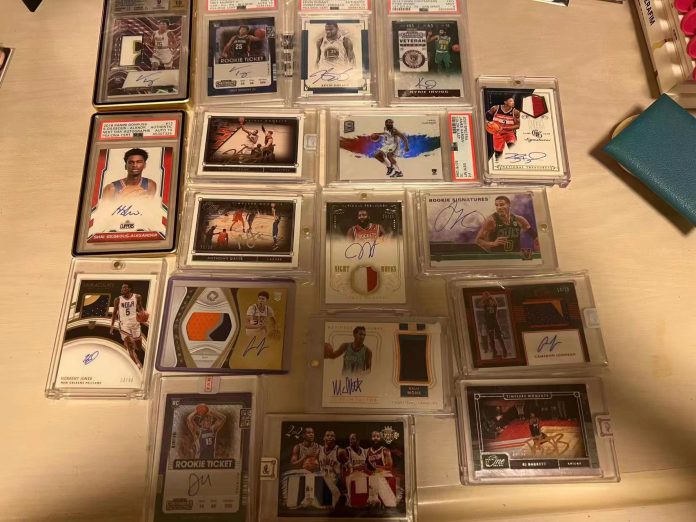Chinese teenagers speculate NBA trading cards with parents’ bank accounts for profits.
By Sean Pan
Alex Lee Kaizhe has invested more than RMB ¥40,000 (US$5,622) since April 2023 running his NBA trading card business on an online trading platform and he receives the payments with his parent’s bank account.
“I mainly use the e-commerce platform Xianyu and do a live stream on Tiktok to promote my business. I also trade cards and sometimes sell lucky grab bags to my Tiktok’s followers,” the high school student says.
Douyin is the Chinese version of TikTok, while lucky grab bags mean packages containing different cards sold at a fixed price and customers do not know what exactly are in the packages when placing the orders.
“For every lucky grab bag I sell, I make a profit of RMB ¥150 (US$21) on average,” Lee says.
Only people over 18 can stream on Douyin, according to the platform’s community rules. Identification documents are needed as supporting documents in the process of verifying the age of the users.
Meanwhile, Xianyu, the second-hand item trading platform owned by Chinese tech giant Alibaba, only allows users over 16 to trade or sell things.

“I am aware of all the restrictions for online trading and selling cards. So, I registered all the accounts with my mom’s identifications and briefly told her what I am doing. My mom approved it,” the 15-year-old says.
NBA trading cards, featuring one or more players of the United States’ National Basketball Association, are seeing a dramatic market expansion.
The gross sales increased by more than 300 per cent between 2010 and 2021, according to eBay’s State of Trading Cards Report, despite of the sluggish economy amid the COVID-19 pandemic.
“I started the business after earning RMB ¥110 (US$15) simply by selling a card at a card fair held in April. I bought the card at a lower cost on an e-commerce platform before the card fair,” Lee says.
“If I am not involved in the card trading business, it’s hard to buy the high-price card I want only using my pocket money,” Lee adds.
Like Lee, primary school pupil Jay Fang Suo, has been selling lucky grab bags on Douyin for a year. He has so far netted a profit of around RMB ¥4000 (US$562).
“I spend most of my pocket money, which is around RMB ¥1500 (US$210), to run my business,” Fang says.
Fang says he does live-stream on Douyin every weekend and has once sold more than 20 lucky grab bags, each pricing RMB ¥99 (US$14) in one night.
“It brings me a sense of achievement when making money by selling NBA trading cards. I really enjoy it,” he says.
Fang says that his father supports him by giving him the father’s identity card and allowing him to use the identity documents to register for Douyin and Xianyu accounts. However, Fang’s mother has no idea of what he is doing.
As the trading card culture catches up in China, firms and individuals are seeking business opportunities from it.
“The low entry barrier of online trading applications can provide an unexpected income for underage people and pose a potential threat,” says Ke Weiguo, founder of a trading card organisation.
Ke held more than five trading card events in China’s southern province of Guangdong this year to promote trading cards to the public and set up a platform for card players to communicate and have a more immersive experience.

However, he thinks that teenagers should not conduct online trading.
“Teenagers should not do trading using online platforms since it is technically illegal and can cause problems for both sellers and buyers,” the planning strategist says.
Ke once bought a trading card at RMB¥140 from a 14-year-old on Xianyu, only to find that the card he received, which is deemed valueless, was different from what he ordered.
“I did not report him to his parents or the police. I simply warned him not to do it again and got my money back,” he says.
“I think teenagers should enjoy playing trading cards by purely exchanging cards with others and buying cards featuring players they like as a hobby, but not looking for profit, since teenagers do not have the time and resources like money for their trading card business in the long term,” he adds.
Mainland Chinese lawyer Chan Weijie comments that the policies supporting the safety of underage users online will continue to refine in China, but it is unlikely to stop teenagers from speculating trading cards.
“The government passed a new version of the Cyberspace Protection Regulations for Minors this year to meet the increasing complexity of the online environment,” he says.
“But I don’t think it is going to change the current landscape too much, because neither underage buying and selling on Xianyu nor live streaming on Douyin raises too much public awareness. Therefore, no policy will be directly implemented for these issues,” the lawyer says.
Sub-edited by Tessa Yau







































